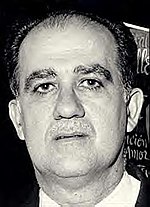Francisco Arriví
| Francisco Arriví | |
|---|---|

Father of the Puerto Rican Theater
|
|
| Born |
June 24, 1915 Santurce, Puerto Rico |
| Died | February 8, 2007 (aged 91) San Juan, Puerto Rico |
| Occupation |
Poet Playwright |
| Genre |
Theatre Poetry |
| Literary movement | Generación de los 40 |
| Notable works | Bolero y plena |
Francisco Arriví (June 24, 1915 – February 8, 2007), a.k.a. Paco, was a writer, poet and playwright known as "The Father of the Puerto Rican Theater."
Arriví (birth name: Francisco Arriví Alegria ) was born in Santurce, a section of the City San Juan, Puerto Rico, to a Spanish father and Puerto Rican mother. He loved to read books, a habit which he acquired at the age of six. His grandmother, who used to take him to the theater every week, inspired his interest in theatrical works. He built a small stage in the backyard of his house on Calle Wilson (Wilson Street) when he was 10 years old where, together with his friends, he would make presentations of children's tales.
He received his primary education at the Padre Rufo and Rosendo Matienzo Cintrón public schools, and his secondary high school education at the Escuela Superior Central (Central High School). He became interested in writing poetry during this period of his life. After he graduated from high school he applied for admission to University of Puerto Rico at Rio Piedras where he continued his education. He wrote one of his first musical compositions, Himno al Alma Máter, which is the official hymn of said educational institution and in 1938 earned a degree in Spanish and Latin-American literature.
Upon his return to Puerto Rico, and under the direction of Leopoldo Santiago Lavandero, Arriví joined the Sociedad Dramática de Teatro Popular (Drama Society of Popular Theater), who called themselves Areyto (Areyto is a Taino word which means "majestic ceremonial dance"). Arriví used his experience with Areyto in his later theatrical presentations.
Arriví earned a living as an educator at the Escuela Superior de Ponce (Ponce High School) where he founded the school's student drama club, the Tinglado Puertorriqueño. In 1940 he began his career as a playwright at the school, after staging his original play Club de Solteros (Bachelors Club).
...
Wikipedia
